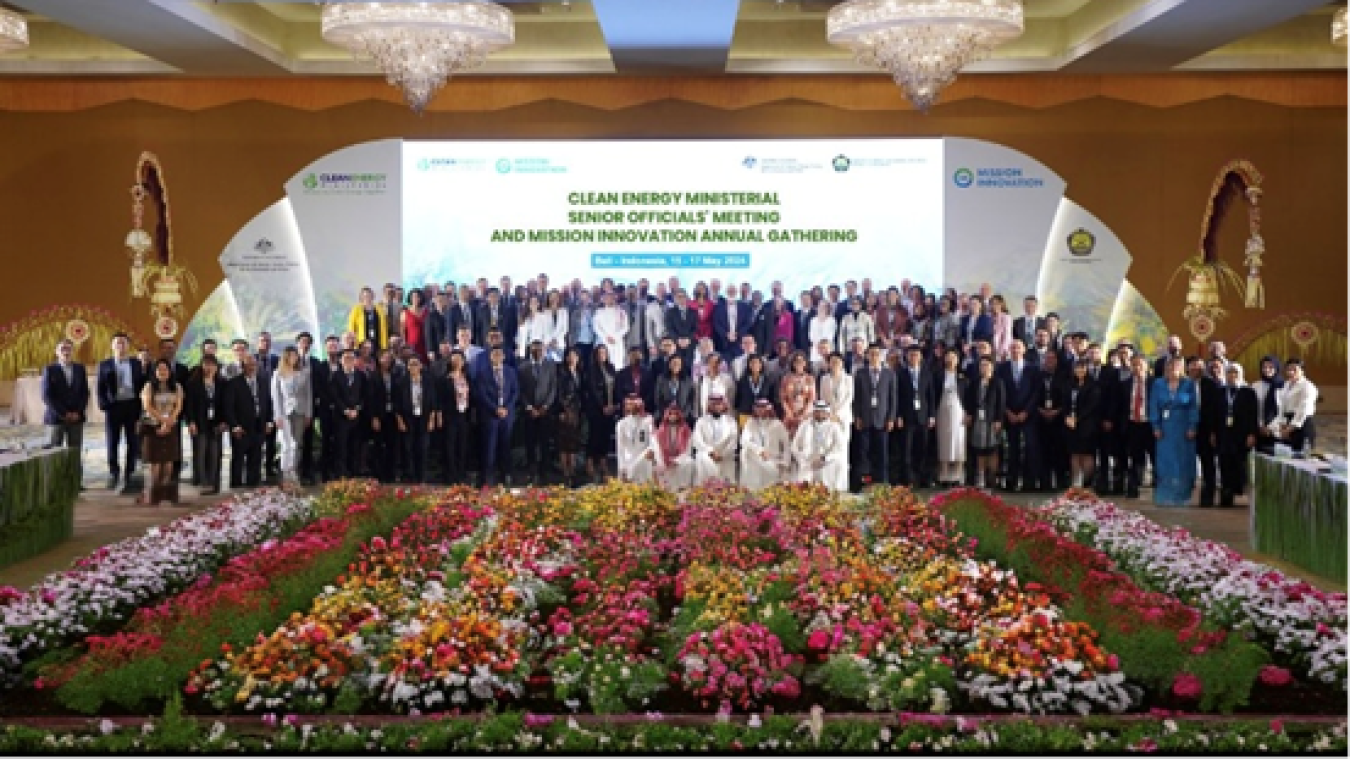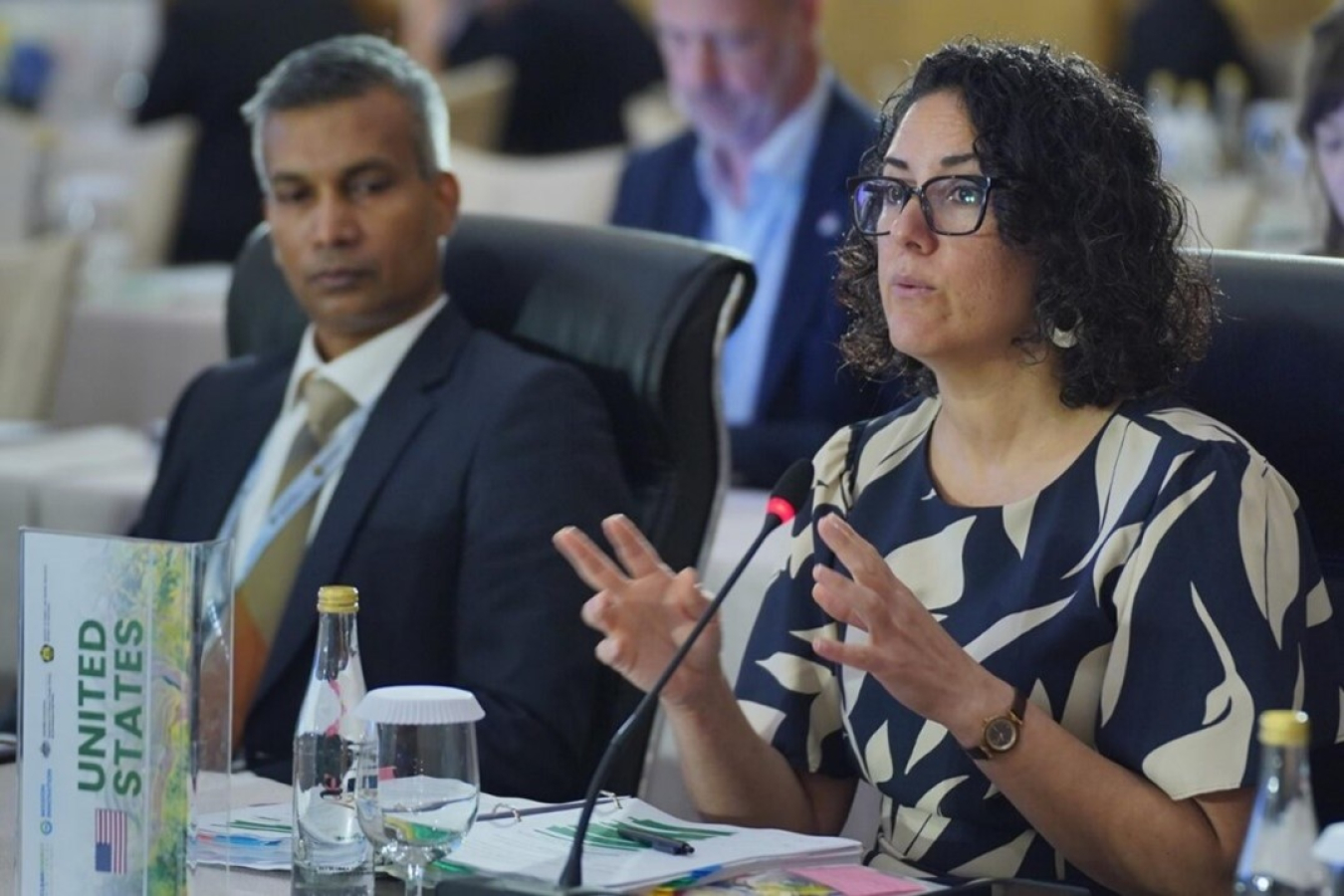As the world races towards net zero, the U.S. DOE joined more than a dozen energy leaders from around the world in Indonesia to advance clean energy deployment and innovation during the CEM Senior Officials Meeting and MI Annual Gathering (May 15 – 17).
Office of International Affairs
July 2, 2024As the world races towards net zero, the U.S. Department of Energy (DOE) joined more than a dozen energy leaders from countries around the world in Indonesia to advance clean energy deployment and innovation during the Clean Energy Ministerial (CEM) Senior Officials Meeting and Mission Innovation (MI) Annual Gathering held May 15 – 17. This event —jointly hosted by Indonesia’s Ministry of Energy and Mineral Resources and Australia’s Department of Climate Change, Energy, the Environment and Water — brought country representatives together to discuss concrete strategies to implement global clean energy pledges and commitments– such as the COP28 tripling renewable energy and doubling energy efficiency pledge. These conversations will culminate in a suite of critical actions that will be announced during the CEM15-MI9 Ministerial taking place from September 30th to October 4th, 2024, in Foz do Iguaçu, Brazil.

Shaping a Sustainable Future: The Role of CEM and MI
CEM and MI are international clean energy coalitions that focus on action. They produce actionable policy packages, advance public-private partnerships, catalyze investment in research, development, and demonstration to keep the Paris Agreement’s goal of 1.5 degrees Celsius within reach. Comprised of voluntary, country-led initiatives, both CEM and MI focus on clean power technologies and policy issue areas of interest to global markets. These include electrified transportation, civil nuclear, clean hydrogen, industrial decarbonization, clean buildings, carbon management, urban planning, power grids, sustainable fuels, as well as cross-cutting issues such as gender equality, workforce development, and clean energy finance and investment. The DOE leads U.S. engagement in the CEM and MI, which also includes support from the U.S. Departments of State, Commerce, the Environmental Protection Agency, and the White House.
Strengthening Ties between CEM-MI: Areas for Collaboration
CEM and MI Secretariats hosted a newly integrated series of discussions to foster collaboration between the organizations and their respective workstreams and missions. Members engaged in high-level strategic discussions on how to develop power sector infrastructure, deploy carbon management technologies, increase financing and investment, and other pressing issues. The two organizations formally met to discuss gender and diversity within CEM and MI inter-governmental programming. They exchanged best practices and ideas on how the Equality in Energy Transitions Initiative can enhance its gender equality work and gear up CEM’s diversity and inclusion programming while partnering with MI to stand up its own gender equality, diversity, and inclusion initiatives.

Meeting the Moment in Mission Innovation
The DOE led a discussion on how MI and CEM countries can support emerging markets and developing economies in building out innovation ecosystems. In addition, DOE hosted a side event exploring the applications of Artificial Intelligence within clean energy transitions. Participants shared their perspectives on the integration of this innovative technology into the work of the coalitions and examined its uses in areas, such as governance policy, energy system operations, energy distribution and utilization.
Concerted Action in the Clean Energy Ministerial
The International Smart Grids Action Network (i.e. ISGAN), a workstream co-led by the United States, Italy, and India, explored ways to create policy tools and frameworks that enable smoother data and information exchange between policymakers, decisionmakers, and key industry and civil society stakeholders in grid development. In addition, the U.S. and Australia co-hosted an event promoting the Clean Energy Solutions Center (CESC) and its offerings of no-cost technical assistance through Ask an Expert Service, open-access policy briefs and resources library, and webinars and workshops on clean energy topics such as hydrogen, mini-grids, and financing. These resources can be found on the CEM website at this link including more content on CESC’s educational YouTube channel. CESC is open and available to interested developing national economies, their partners, and stakeholders. Click on the links to learn how YOU can benefit!

